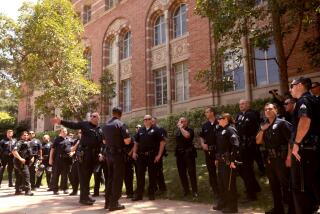5 Panelists--2 With AIDS, All With a Mission : Education: Speaking to middle-schoolers, a group from the Foothill AIDS Project offers testimony that ‘anyone can get it.’
At first, the doctor dismissed Kimberly Richartz’s request for an AIDS test. She was 23, married, with a 15-month-old child.
It was true that both she and baby Meghan suffered chronic health problems, but Richartz was a nice girl, a pretty, clean-cut girl who had gone to a private, all-girls school in Claremont.
“When I asked for the test, they said, ‘Don’t be ridiculous, you’re not the type of person who would have AIDS,’ ” Richartz, now 25, told a room of rapt seventh-graders in San Dimas on Wednesday morning.
They were wrong.
Two weeks later, Richartz learned that both she and her baby carried the AIDS virus; her husband tested negative. In measured, solemn terms, Richartz explained to the Lone Hill Middle School students that she had been infected through heterosexual sex while in high school.
“I thought I was taking care of myself,” Richartz said. “I was taking birth-control pills and going to a gynecologist. But I had low self-esteem; I was too meek . . . to ask my partner to wear a condom. . . . I thought I was going to lose the guy.”
Richartz was one of five speakers from the Foothill AIDS Project who spoke Wednesday as part of “Let’s Talk,” an educational program at Lone Hill that is broadcast over local cable TV.
This week’s episode--a frank discussion about AIDS by health professionals, a mother whose son died of AIDS, and two people who carry the disease--was taped by Cablevision Channel 29 and will be broadcast throughout San Dimas and La Verne on Monday and Wednesday at 7 p.m.
The talk had the support of Bonita Unified School District officials, Lone Hill Principal Marc Jackson and the school’s PTA.
“Our kids today are exposed earlier to the possibility of sex, so they need to be aware of the danger and how to take steps not to get the disease,” said Cindy Hart, a PTA member who sat through the talk with her son Nathan, 12. “If we can prevent one person from getting AIDS, it will have helped.”
Both panelists with AIDS said they went public with their painful stories to educate young people to the dangers of the disease and thus halt its spread.
“A lot of schools we go to, we have to watch what we say--we can’t mention condoms--but when I talked to Marc Jackson, he said, you can say anything you want within reason,” said Michael Villescas, 35, the other panelist with AIDS.
“It’s good we came to a younger school so they can start learning about this earlier,” Villescas said. “The sooner they know about safe sex, the better, and we want to plant the seed for them to realize they can do something to prevent it.”
Villescas said he became sexually active at 13, the age of some of the students he spoke to Wednesday. “You guys out there who are planning to get active, you have to use protection,” Villescas said.
Jackson said student interest in AIDS skyrocketed last year after the disclosure that basketball hero Earvin (Magic) Johnson tested HIV positive.
On Wednesday, students learned that AIDS is contracted through the exchange of bodily fluids, unprotected sex, shared needles and blood transfusions. Bonita Unified School Nurse Marge Canfield told them they shouldn’t share razors, pierce each others’ ears or give each other tattoos.
The students heard tragic stories and tales of caution. And they shared the grief of panelist Leslie Peterson, whose 22-year-old son Steven died of AIDS last fall after receiving a contaminated blood transfusion.
Peterson said her son wanted more than anything to meet Johnson before he died. As she spoke, she held up a photo of Steven with the Lakers star. The young man, who was in a wheelchair and hooked up to a respirator, got his final wish.
“It’s really hard to believe it can happen to you,” Peterson told the students. “The most impressive thing I can tell you is that it’s not something that just happens to someone else.”
As Jackson opened up the floor to questions, a dozen hands shot up. “What did you do when you first found out you had AIDS?” one girl asked Richartz.
“I cried hysterically for two weeks,” she replied.
“Do people ignore you when they find out you have it?” asked another.
Richartz took a deep breath and said most people have rallied around her, but one close friend from high school abandoned her. She said she is afraid that other friends won’t want their children to play with her daughter.
As the talk ended, students said they were moved and had learned important things that day about AIDS.
More to Read
Start your day right
Sign up for Essential California for news, features and recommendations from the L.A. Times and beyond in your inbox six days a week.
You may occasionally receive promotional content from the Los Angeles Times.






